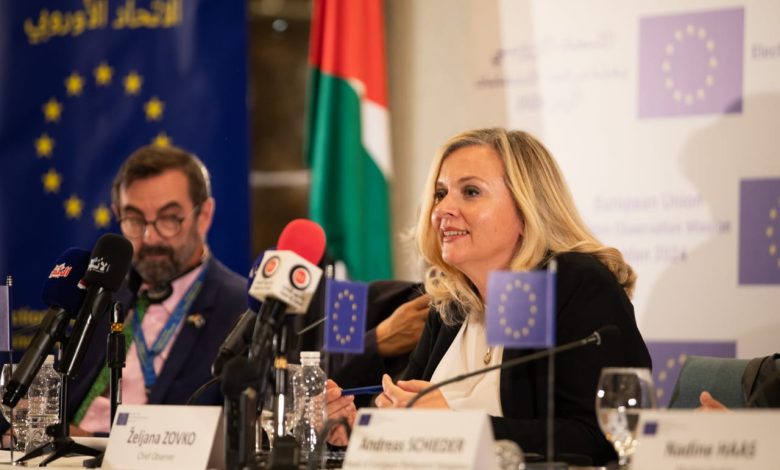
Jordan Daily – On Sept. 10, 2024, more than 1.6 million Jordanian voters participated in a well-organized and inclusive election, according to Željana Zovko, Chief Observer of the European Union Election Observation Mission (EU EOM).
Speaking at a press conference in Amman, Zovko said the Independent Election Commission (IEC) efficiently managed the process despite regional uncertainty due to the Gaza conflict. The election proceeded on schedule, reflecting Jordan’s commitment to its electoral timeline.
EU observers visited 622 polling stations across all of Jordan’s electoral districts, monitoring voting, counting, and the aggregation of votes in District Election Committees. Their work continues as results are yet to be finalized. “Election day was calm, professional, and orderly,” Zovko said, adding that there was a high presence of representatives from competing lists. However, campaigning outside polling stations, although legally prohibited, was widespread.
Jordan’s legal framework for elections largely aligns with regional and international democratic commitments. Zovko praised the 2022 Election Law and Political Parties Law, which aim to increase the role of political parties in the House of Representatives over three election cycles. These reforms, part of Jordan’s political modernization process, also aim to enhance the inclusion of women, youth, people with disabilities, and ethnic and religious minorities.
Notable new transparency measures include publishing results at the polling station level, a recommendation from a previous EU mission. However, gaps remain in areas like campaign finance and media freedom. A significant development in this election was the reservation of a woman’s seat in each Local Electoral District.
“These well-organized elections are part of Jordan’s modernization process toward promoting an inclusive multi-party system,” said Andreas Schieder, head of the European Parliament delegation that joined the EU EOM. He emphasized the importance of a functioning democracy for stability and prosperity.
Zovko noted overall confidence in the voter lists’ accuracy and inclusiveness, as well as a smooth candidate registration process. However, transparency issues were raised due to the exclusion of candidates and list representatives from observing the vote tabulation process.
While the final two weeks of the campaign were more active, EU observers reported a general lack of interest from political parties and the public during the five-week campaign period. Despite an IEC-led voter education campaign, concerns were raised over voter understanding of the new General Electoral District voting procedures. Media and online platforms provided limited information about candidates, and journalists faced restrictions on freedom of expression under Jordan’s Cybercrime Law and Penal Code.
The EU EOM has been in Jordan since July 29, 2024, at the invitation of the IEC, with a mandate to assess the electoral process. A total of 120 observers from EU member states, Canada, Norway, and Switzerland participated in the mission. The EU EOM will remain in Jordan to monitor post-election developments and will issue a final report with detailed recommendations within two months of the election’s conclusion.

